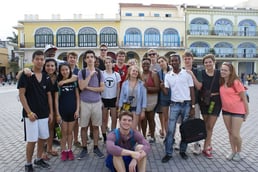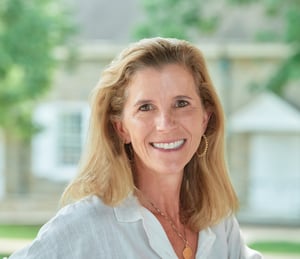We have touched on the importance of travel for
the young in previous posts. If you have been lucky enough to enjoy travel in your life, then you, too, might have experienced some of the benefits that come from leaving your comfort zone. This departure from the safety of what is “known” stimulates intellectual curiosity, brings knowledge, and allows for personal growth. Lili, a member of the class of 2015 at Westtown School, enjoyed the opportunity to be a part of Westtown en Cuba, a service and language immersion program for students, and has shared some knowledge she gained from the experience. Read on for an excerpt from her reflections on her trip to Cuba.
From the moment we had boarded the plane at the Tampa airport, I had pressed myself against the window, watching the drops of dew slide down the glass in the early morning sunlight and craning my neck to glimpse the flashes of landscape between puffs of clouds. I wanted to see the whole Cuba, to glimpse the kidney-shaped outline tucked into the cerulean waves of the Caribbean. Every so often, I looked away from the window, watching the families huddled in their seats, clutching plastic baby toys and diapers, also leaning against the window as we circled above their island. As I looked below, I saw the whitecaps of waves, the trails of cruise ships in the blue water, and finally, too soon, the faint outline of trees, buildings, and fields in the distance. We had descended much too rapidly for me to glimpse the whole island, and I felt an odd sort of panic, my sneakers tapping out a rhythm on the airplane floor. Cuba had seemed so tiny in my mind, so easily compressed into something small and understandable. But as we landed, I was disoriented; I could only see the palm tree growing up from the dusty side walk, the rusting iron fence of the airport, and the stray dog loping up to greet us as we descended from the steps of the plane.
Ten days later, we are clustered on a beach in Viñales, the breeze from the ocean buffeting around us, bottles of water clutched in our hands, the sun searing relentlessly into exposed shoulders and necks. Every day, we gather in Meeting for Worship, bringing this part of ourselves to each place we visit in Cuba. Most times, I listen, eagerly anticipating my classmates’ words, waiting for them to offer some nugget of guidance or insight.
Today, I decide to speak up, raising my voice against the sound of the waves. I remember that first day on the airplane, and how I had tried to see the whole island. I talk about the routine we have established in Cuba: waking up to the cool ocean breeze, eating fresh fruit in the hotel café, leaving with backpacks in tow for a day of patting together slabs of clay with the artists, splashing colorful murals onto the walls of El Proyecto Comunitario Muraleando, slipping through the narrow side-streets of Habana Vieja, and exchanging convertible pesos for tarnished jewelry or faded movie posters. Despite the hours we have spent here, and despite the routine, I still feel that sense of panic that I felt when we landed in Havana, and an inability to grasp what is happening around me. When I am finished speaking, my words fade into the sound of the surf lapping insistently against the beach, yearning to touch our toes.
Profe Mónica speaks out of the silence: “Who gave us the right to come here and watch? To make a judgment, to draw a conclusion, to try to understand a people? Who says that they want to be understood, that understanding is the goal of this trip?” Tears pool in my eyes as she speaks. I am rattled by her words, stung by their authenticity and force, and ashamed by my effort to understand. She is telling me that I do not need to have answers, that I did not come to Cuba to draw a conclusion, and to return with some sort of authority to speak of the Cuban experience. She seems to understand that I have been very much an observer, these two weeks, watching through the windows of the tour bus, peering down into crumbling roofs, and staring unabashedly at the people milling about on street corners. I saw them, but I didn’t know them. I didn’t know if the Cuban people were happy, why some want to leave and some did not, if socialism was an effective governmental system, how the people we met felt about us visiting Cuba.
I can guess at these answers, present small snippets of information that I have collected as I observe, but I don’t know the truth. I can talk about the tear that slipped onto Davíd’s scruffy face as he waved goodbye to us from the sidewalk of Muraleando, the rich lilting tone of Mambu’s voice as she sang to us, the flan swirling around on my tongue, the sound of our tour guide Hiroshi’s guttural laughter as we sang together on the bus, how the dance instructor’s hips swayed naturally to Salsa, Mozambique and Mambo, how my feet twisted and wobbled when I tried to replicate the intricate steps. How the wrinkled hands reached through the slats of the windows as we sat in the restaurant. “Dinero? Por Favor?” I can tell you about the socialist propaganda that stood in the place of billboards, huge faces of Ché and Fidel shouting “Viva Cuba, Viva la revolución!” I can tell you what I saw, but not what it means.
In my final days in Cuba, I recited Profe Mónica’s message in my head. I had no right to judge, to take what I saw and twist it into something that made sense in my own world. I had tried to approach Cuba as I did my academics - methodically observing, recording my observations, and drawing conclusions. I was too separate, too restrained by my need to observe and understand that I failed to make vital connections: giggling with the Cuban girls on the side of the street, or playing soccer with the boys at the farm. I realized that only by shedding my role as an observer, could I truly submit myself to the Cuban culture. So when we swam in the ocean, I splashed in the water alongside everyone else, tossing the volleyball back and forth with the Cuban boys who ran up to us on the beach, digging my toes into the sand, not trying to wrap my head around what it meant, or what I had learned. That final night in Cuba, when people danced, swaying their hips to the beat of hand drums and acoustic guitars, I joined in, raising my arms and twirling alongside them.
I knew that when I returned from Cuba, people wouldn’t understand this realization, and they would ask me the same questions I had asked myself: “So what did you learn? Are they happy? How’s the government? The economy?” So many questions, so many answers that I do not have, that I will never have. I went to Cuba to watch, to listen, to observe, to submit myself to a culture and a people. So when they ask me, I will tell them about the breeze, the gaunt, wrinkled faces stretched into smiles, the bare tummies of the children as they danced for us, and the arched back of the donkey, straining against the weight of the palm leaves as he trudged up the hill.
This blog post is an excerpt from an essay by Lili Domenick which was selected to be read at Westtown School's 2015 Commencement ceremony. Lili Domenick '15, recipient of The Coulter Outstanding Language Award, The Margaret Doty Ecology Award, and The Alumni Association Highest Scholarship Award, is currently a student at Haverford College.



